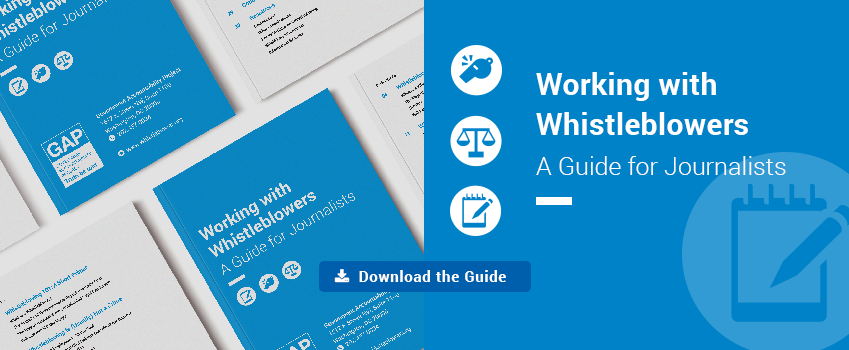Whistleblower Guides

Speaking Up for Science: A Guide to Whistleblowing for Federal Employees
Working with Whistleblowers: A Guide for Public Interest Organizations
Working with Whistleblowers: A Guide for Journalists (PDF)
With the government’s assault on “leaks” and whistleblowers reaching a fever pitch, there has never been a more critical time to ensure that whistleblowers and the journalists who work with them are equipped with the tools they need to safely and effectively report on waste, fraud and abuse to the public. That is why Government Accountability Project has put together Working with Whistleblowers: A Guide for Journalists, to help journalists navigate the complexities of working with whistleblowers.
Topics covered in the Guide include:
- Whistleblowing 101: A Short Primer
- What is a Whistleblower?
- The Majority of Whistleblowers Report Internally First
- The Risk of Reprisal & the Complicated Legal Landscape
- Will Lawyers Kill the Story
- Whistleblowing is (Usually) Not a Crime
- Intelligence Employees v. All the Rest
- Risks of Criminal and Civil Liability Outside of the Context of Classified Information
- Is it Leaking or Whistleblowing?
- Classified Information
- How You Can Help Your Source
- It’s All About Trust
- Advice for Whistleblowers on Best Practices
- Does Your Source Need Anonymity?
- Other Paths to Get the Information
- Secure Communications & Information Security
The power of whistleblowers to hold institutions and leaders accountable often depends on the critical work of journalists, who verify whistleblowers’ disclosures and then bring them to the public. The partnership between whistleblowers and journalists is essential to a functioning democracy.
Government Accountability Project works closely with media outlets and investigative journalists to promote accountability based on disclosures by whistleblowers who seek our assistance. Working with Whistleblowers: A Guide for Journalists, seeks to offer information critical to understanding the complex issues involved with an employee’s decision blow the whistle on serious wrongdoing. We hope to help journalists have whistleblowers’ backs, rather than unwittingly exposing them to further retaliation. While by no means comprehensive, we hope this guide not only generates support for the important function whistleblowers play in advancing civil society, but also awakens awareness for the special care required when utilizing whistleblowers’ information.
If you are a journalist or media outlet interested in learning more about this Guide or working with whistleblowers, please contact Dana Gold, Government Accountability Project’s Director of Education and Strategic Partnerships, at [email protected].

